Two etiquette experts share what you need to know to make sure everyone has a lovely visit—and you get invited back

How to Be a Good House Guest: 16 Rules You Need to Follow

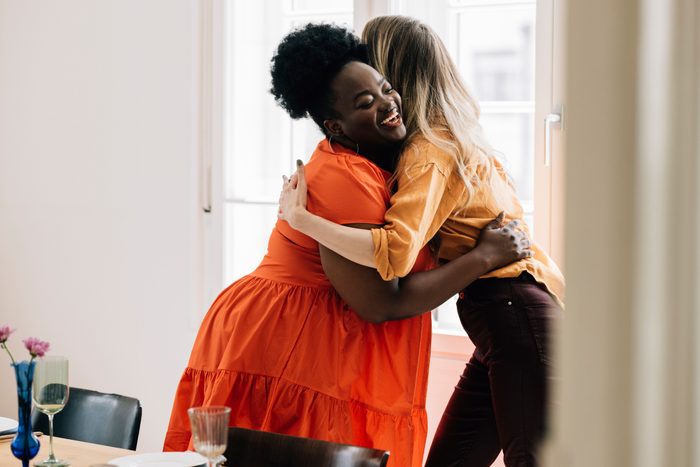
Clear your arrival and departure dates beforehand
The number one rule for being a good house guest? Do not show up unannounced or without a plan. “Always communicate with your host in advance about when you plan to arrive and leave and make sure it works for them,” Goss says. When planning your stay, remember the old adage, “fish and house guests start to stink in three days.”
“Open-ended stays are generally not a good idea, but if you need to leave some wiggle room, discuss it with your host first and if that’s okay with them, update them each day about the length of your stay,” Swann says.

Go with the flow of the home
Are your hosts early risers who eat breakfast on the patio? Then you should try to join them, even if you’re a night owl who hates small talk over coffee and bagels. It’s not about changing your personality and tastes—you really don’t have to eat the pancakes if you’re gluten-free—it’s about not disturbing the flow and rituals of the home, Swann says. “Follow your host’s lead, generally, for things like meal times, bedtimes and household customs,” she advises. “You don’t have to copy them but you want to fit in with them.”

Bring a small gift
Good house guests never show up empty-handed. “A small token of appreciation is always a good idea,” Goss says, adding that it could be something like a nice bottle of hand soap, a scented candle, tea towels or a bottle of wine (but only if you already know they drink). Another good idea for hostess gifts is to bring something local to your home, like a jar of honey, artisan jam or a bag of candy that your town is famous for.
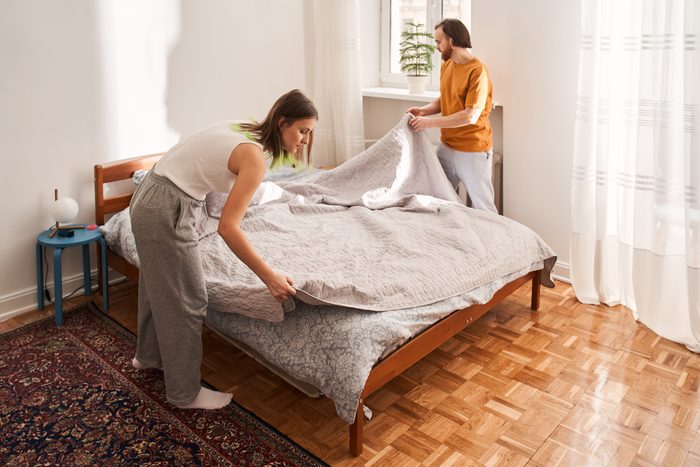
Make the bed, don’t strip it
Another house guest etiquette rule: keep your room neat and tidy, including making the bed each morning (even if you don’t at home). “Aim to treat it even nicer than you would your own room,” Goss says. On the last day of your stay, tidy the bed, making sure all pillows and decorative throws are up on the bed and off the floor. “The old advice was to strip the sheets off the mattress on the last morning of your stay to make it easier for the host to wash them, but many people feel like this is too invasive,” Swann says. (What if the mattress has an unsightly stain? Yikes!) “If you really want to help clean, ask the host what you can do to help clean up your room and do that.”
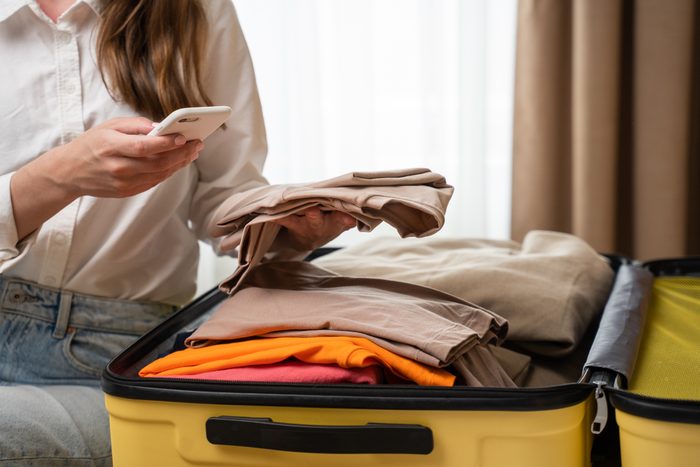
Share your daily schedule
If the purpose of your visit is to see the people you are visiting then you will do whatever they are doing. However, if you’re in town for a different reason, like a work conference or college tour, and you’re staying with a friend or family member then you should let them know each day what your schedule will be. “It’s polite to let your host know about what time you’ll be leaving and returning each day so they know when to expect you,” Swann says. “You can also discuss things like if you’ll be there for dinner or if you’ll need access to the office.” If you’ll be later or earlier than expected, drop a quick text to your host to let them know. This allows them to plan around you and saves a lot of worry.

Treat them to dinner or an experience
If you’ll be staying more than one or two nights (and even then), it’s a kind gesture to offer to bring or order dinner in or take your hosts out to a restaurant, Swann says. “A lot of hosting involves cooking for your guests, so consider relieving your host of this pressure for at least one meal,” she says. Ask your hosts what they like to eat and if they prefer to dine in or go out. If food isn’t their love language you could treat them instead to an experience like a movie out or a game night in (you can gift them a new game).
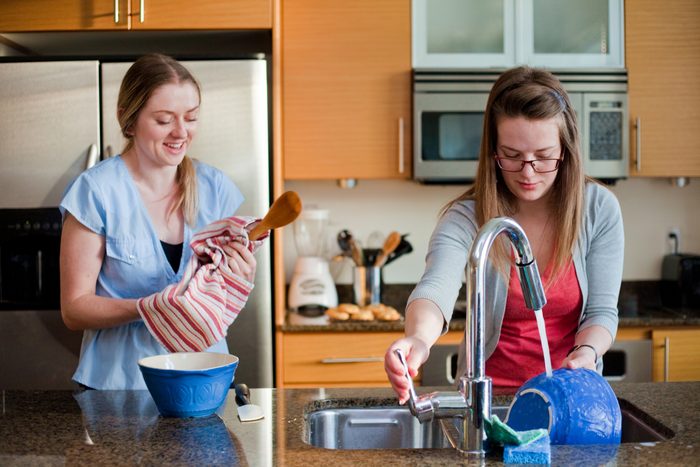
Help with clean up each day
Simple things like putting your dishes in the dishwasher, helping to put away clean dishes, sweeping, taking out garbage or other small household tasks are a surefire way to ensure you get invited back, Goss says. “Be aware of what’s going on around you,” she says. “If your host is cleaning, offer to help. They may tell you to just relax but it’s good house guest etiquette to at least offer.” And always clean up your own messes—no leaving half-full glasses on the coffee table or snack wrappers on the sofa!
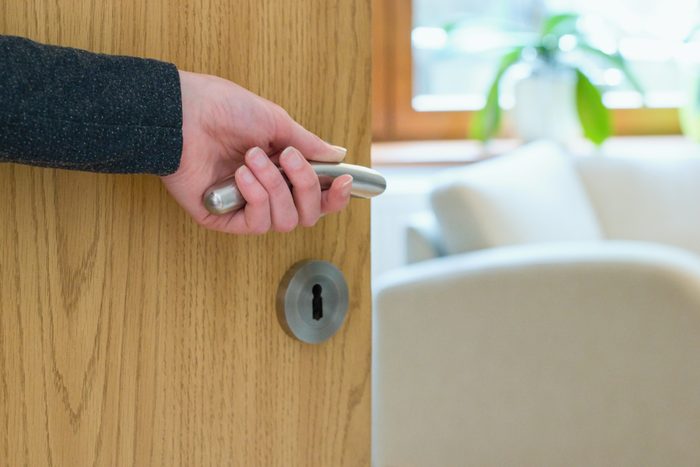
Stick to your room and the common rooms
“Just because you’re staying in someone’s home doesn’t mean you have the run of the whole house,” Goss says. Keep your belongings confined to the room you’re staying in and stick to hanging out in the common areas like the kitchen or living room. Don’t go in bedrooms, offices, the master bath, basement or other areas without permission. “It’s about respecting their privacy,” she adds.
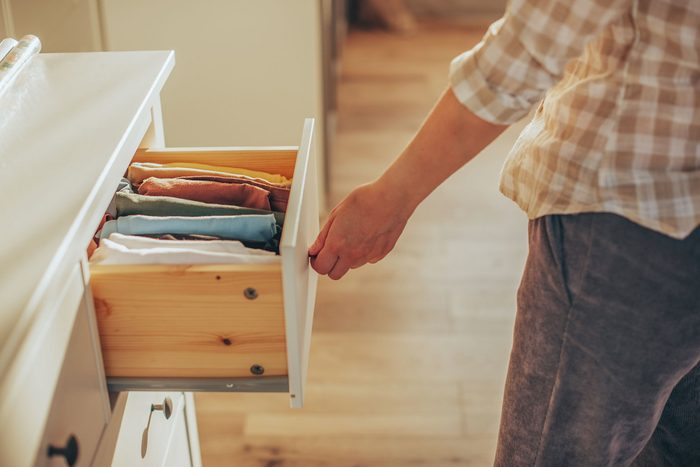
Don’t go through closets or cabinets
Just like you wouldn’t go into the master bedroom without asking, don’t rummage through kitchen or medicine cabinets, the refrigerator, the coat closet or other closed areas, Goss says. “If it’s got a closed door, ask before opening it,” she says. You should never rummage just to be nosey but if you’re looking for something specific—say the salt shaker or extra toilet paper—ask your host first.

Keep the noise level down
You may love blasting your music while you shower but avoid playing anything loud over your phone speakers when staying in another person’s home. This includes watching videos, listening to podcasts, video or regular phone calls and games with sound effects. It also includes non-tech activities like singing, whistling, and speaking loudly. “Check your noise level in general, especially if your host has young children,” Goss says.
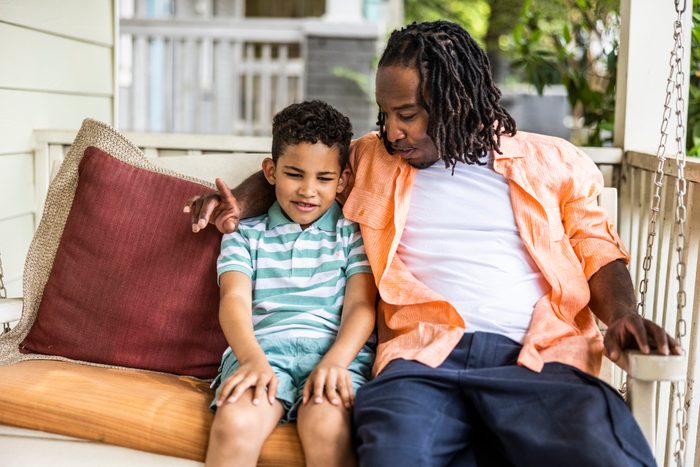
Coach children in advance
Bringing children as house guests adds another layer of etiquette to be aware of, says Goss, who is the mother and foster mother of 50 children (yes, 50!). “I would always talk to the kids at least a week before traveling,” she says. “Explain to them what the rules will be and then practice them at home. Teach them how to be polite houseguests.” Once there, keep an extra close eye on little ones to make sure they don’t get into things they shouldn’t and be sure to clean up any extra messes they make.

Don’t post their home on social media
Posting about your travels while they are happening can make you a target for thieves and the same goes for posting the home where you are staying, Swann says. Avoid posting detailed pictures of the interior or the exterior of the home and don’t share the address. “It’s not just about safety, though; it’s also about privacy,” she says. “Some people just don’t want themselves or their home put online and you should respect that.” Always ask before posting pictures of your hosts or their home (or just don’t do it). And always practice good social media etiquette.
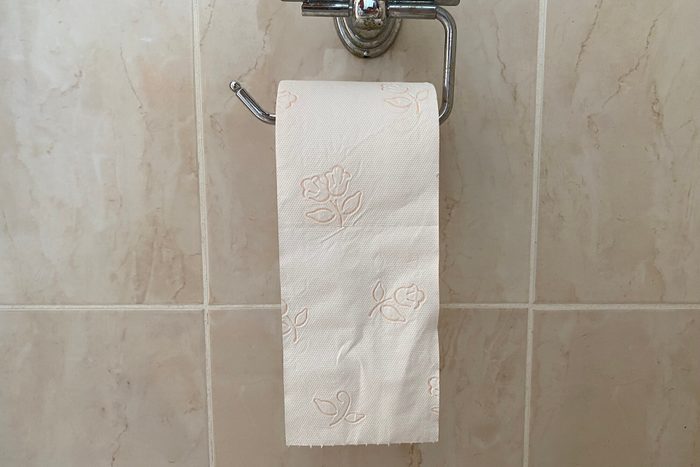
Use the air freshener in the bathroom
Bathroom etiquette is a whole discussion on its own but it boils down to treating their bathroom like you would your own or even better, Swann says. “If you use up the toilet paper, replace it. Hang up wet towels. Don’t go through their drawers or use their toiletries. Wipe off a wet countertop. Little things like that go a long way,” she says. “And if there is a can of air freshener in there where you can see it? Use it if you, ahem, left an odor in the bathroom.” P.S. If you clog the toilet, you need to be the one to unclog it and clean up any mess.
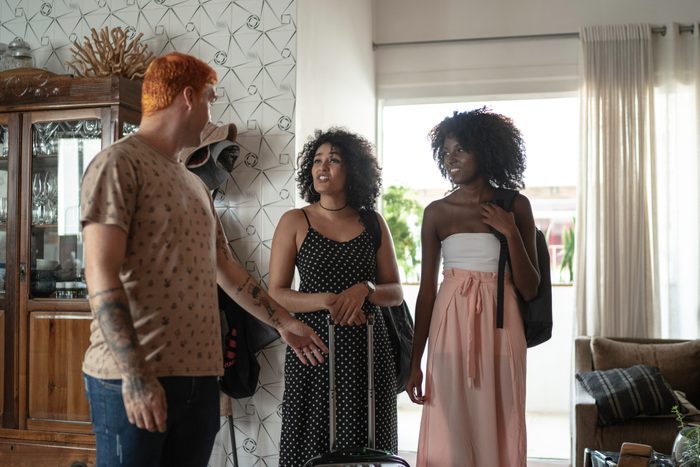
Don’t bring strangers into the home
It’s not just one-night stands that are bad manners. “Don’t bring anyone who is a stranger to your host into their home without asking first,” Swann says. This includes people you may know, like coworkers and other friends, and people you don’t know like delivery people and door-to-door sales reps.
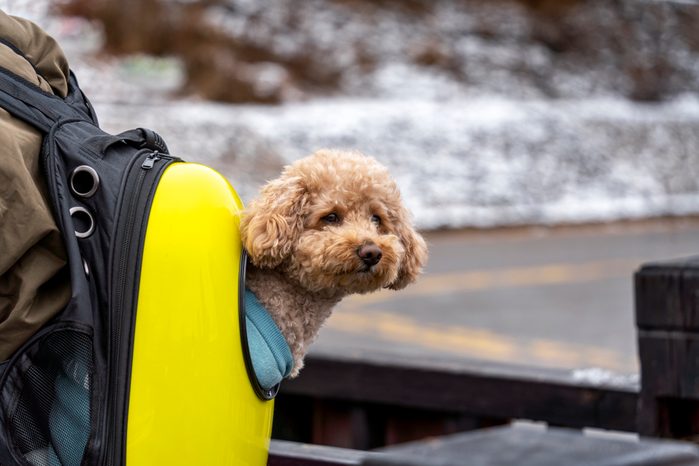
Ask permission to bring pets
Some people prefer to travel with their companion animals but you should always ask well before your trip if your hosts are okay with pets, Goss says. “Even if they are animal lovers, they may not want yours staying in their home,” she says. “Not to mention that many people are allergic to animals or just don’t enjoy them.” If they do give permission to bring Fluffy or Fido, be extra diligent about cleaning up messes and fur and watching them so they don’t cause damage or fight with other animals.

Send a thank-you card afterward
Goss’ number one tip for being a better houseguest? “As I’m headed out, I always leave a thank-you card with a lovely note to my host. It’s a little extra that makes them feel special and loved,” she says. In the card, she advises writing a thank-you message, a happy memory you have of your stay there, something you enjoyed in their home and a warm closing. “I keep a package of thank-you cards in my purse. I don’t ever want to miss an opportunity to show appreciation!” she says. Not as organized as Goss? You can always send a thank-you card or even a text after you leave—just make sure to do it within three days of returning home.
About the experts
|
Why trust us
At Reader’s Digest, we’re committed to producing high-quality content by writers with expertise and experience in their field in consultation with relevant, qualified experts. For this piece on hotel etiquette, Charlotte Hilton Anderson tapped her decade of experience as an etiquette writer, as well as interviewed three etiquette experts. We rely on reputable primary sources, including government and professional organizations and academic institutions as well as our writers’ personal experience where appropriate. We verify all facts and data, back them with credible sourcing, and revisit them over time to ensure they remain accurate and up to date. Read more about our team, our contributors and our editorial policies.
Sources:
- Elaine Swann, certified etiquette expert and founder of the Swann School of Protocol and author of Let Crazy be Crazy; phone interview Sep. 6, 2024.
- Jan Goss, CEO and founder of Show Up Well consulting and author of Protocol Power; phone interview Sep. 4, 2024.



















